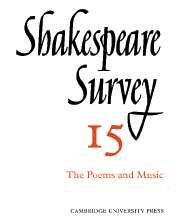Book contents
- Frontmatter
- Twentieth-century Studies in Shakespeare's Songs, Sonnets, and Poems
- Songs, Time, and the Rejection of Falstaff
- Shakespeare’s Sonnets and the Elizabethan Sonneteers
- Love’s Confined Doom
- Beasts and Gods: Greene’s Groats-worth of Witte and the Social Purpose of Venus and Adonis
- From Shakespeare’s Venus to Cleopatra’s Cupids
- Venus and the Second Chance
- Some Observations on The Rape of Lucrece
- An Anatomy of The Phoenix and The Turtle
- Shakespeare and the Ritualists
- Illustrations of Social Life IV: The Plague
- The Soest Portrait of Shakespeare
- International Notes
- Shakespeare Productions in the United Kingdom: 1960
- S. Franco zeffirelli’s Romeo and Juliet
- The Year's Contributions to Shakespearian Study 1 Critical Studies
- 2 Shakespeare’s Life, Times and Stage
- 3 Textual Studies
- Book Received
- Index
- Plate Section
Twentieth-century Studies in Shakespeare's Songs, Sonnets, and Poems
Published online by Cambridge University Press: 28 March 2007
- Frontmatter
- Twentieth-century Studies in Shakespeare's Songs, Sonnets, and Poems
- Songs, Time, and the Rejection of Falstaff
- Shakespeare’s Sonnets and the Elizabethan Sonneteers
- Love’s Confined Doom
- Beasts and Gods: Greene’s Groats-worth of Witte and the Social Purpose of Venus and Adonis
- From Shakespeare’s Venus to Cleopatra’s Cupids
- Venus and the Second Chance
- Some Observations on The Rape of Lucrece
- An Anatomy of The Phoenix and The Turtle
- Shakespeare and the Ritualists
- Illustrations of Social Life IV: The Plague
- The Soest Portrait of Shakespeare
- International Notes
- Shakespeare Productions in the United Kingdom: 1960
- S. Franco zeffirelli’s Romeo and Juliet
- The Year's Contributions to Shakespearian Study 1 Critical Studies
- 2 Shakespeare’s Life, Times and Stage
- 3 Textual Studies
- Book Received
- Index
- Plate Section
Summary
A consideration of the role that music plays in the dramas of Shakespeare is to be found in reference works of all kinds from the comprehensive encyclopaedia to the brief article in a periodical. General, and specifically English, histories of music include material on Shakespeare, and the forthcoming volume IV of the New Oxford History of Music will deal with music for the theatre in Shakespeare’s time.
The researches of eighteenth-century scholars provided the basis for subsequent research. It is, perhaps, not generally realized how many musical problems are touched upon in Bishop Percy's Reliques of Ancient English Poetry of 1765. His second book 'containing ballads that illustrate Shakespeare' was a pilot study that tried to illuminate the Shakespeare lyrics by reference to sources of the sixteenth and seventeenth centuries. This enthusiasm for the old ballads also distinguishes Thomas Warton's History of English Poetry (1774-81). The sympathies of Percy and Warton, harbingers of the coming Romanticism, differed widely from the antiquarian bent of a Joseph Ritson, yet the latter's Ancient Songs (1790; rev. W. C. Hazlitt, 1877) is also a standard source for glosses of later commentators.
- Type
- Chapter
- Information
- Shakespeare Survey , pp. 1 - 30Publisher: Cambridge University PressPrint publication year: 1962



